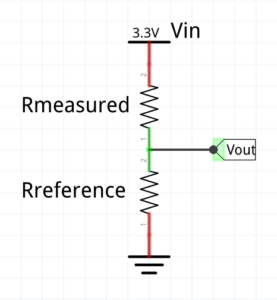3.9 Reading a Resistor Value
I used the ADC previously to read the internal sensors, so it’s simple
to move on to external ones. Once you can read the value of a resistor,
there is a wide choice of analog applications: thermistors, photocells,
potentiometers, sliders, joysticks …
Voltage Divider Circuit

Vout = Vin * Rref / (Rref + Rmeasured)
ADC Readings
Assuming the ADC is configured for 12 bit precision and return a value
in the range [0 … 4095]
Vout = VADC = VDDA * ADCRAW / 4095
Vin = VDDA
~VDDA~ * ADCRAW / 4095 = ~VDDA~ * Rref / (Rref + Rmeasured)
ADCRAW * Rmeasured = Rref * (4095 – ADCRAW)
Rmeasured = Rref * (4095 – ADCRAW) / ADCRAW
Rmeasured = Rref * (4095 / ADCRAW – 1)
Devil in the whatnots
- Avoiding division by zero.
- Integer versus floating point calculation.
- Choosing the reference resistor.
- Calibration of the reference resistor.
#include <limits.h>
int R = ADCraw ? Rref * (4095 / ADCraw - 1) : INT_MAX ;
int R = ADCraw ? Rref * 4095 / ADCraw - Rref : INT_MAX ;
© 2020-2024 Renaud Fivet
